Blue supermoon 2023: What to know, when to look up Wednesday night
July's full Buck Moon as seen around the world
The full moon to kick off July wasn't just a full moon, but the year's first "Super" moon. It's also known as the Buck Moon. Here are a compilation of photos as the moon was seen around the world.
Stargazers are in for a double treat this week: a rare blue supermoon with Saturn peeking from behind.
This will be the closest full moon of the year, just 222,043 miles (357,344 kilometers) or so away. That’s more than 100 miles (160 kilometers) closer than the Aug. 1 supermoon.
RELATED: Watch: Fireball meteor soars across Colorado night sky
As a bonus, Saturn will be visible as a bright point 5 degrees to the upper right of the moon at sunset in the east-southeastern sky, according to NASA. The ringed planet will appear to circle clockwise around the moon as the night wears on.
Here’s what to know about the rare, exciting celestial event.
Why is it considered a blue moon?
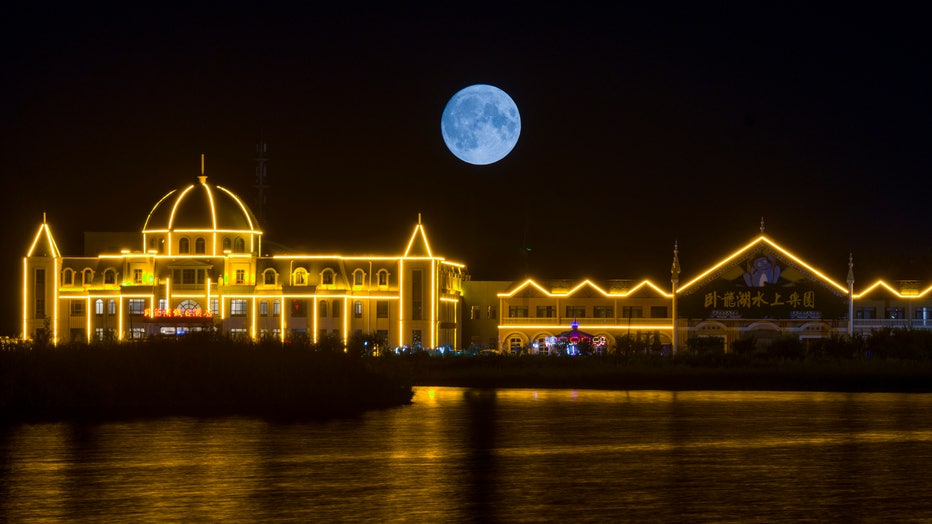
A "supermoon" is seen above buildings at Wolong Lake Scenic area in Shenyang, Liaoning province, China, August 30, 2023. The largest "supermoon" in 2023 will appear in the sky at 9:36 am on August 31, according to the Purple Mountain Observatory of t
The cosmic curtain rises Wednesday night with the second full moon of the month, the reason it’s considered blue.
A blue moon has nothing to do with the color of the moon, and according to NASA, "once in a blue moon" happens every two-and-a-half years, on average.
What is a supermoon?
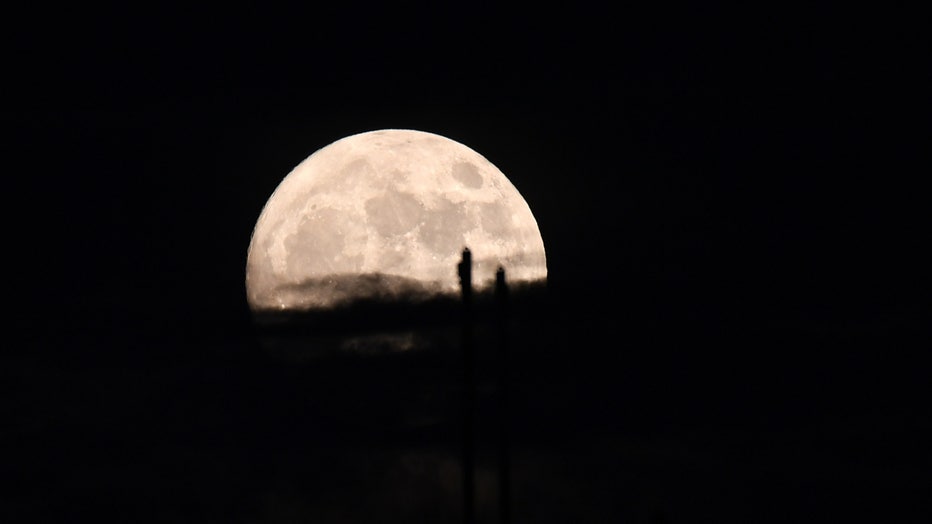
Photo taken on Aug 30, 2023 shows the ''supermoon'' in Renhuai city, Southwest China's Guizhou province. (Photo by Costfoto/NurPhoto via Getty Images)
It’s dubbed a supermoon because it’s closer to Earth than usual, appearing especially big and bright.
When’s the best time to see the blue supermoon?
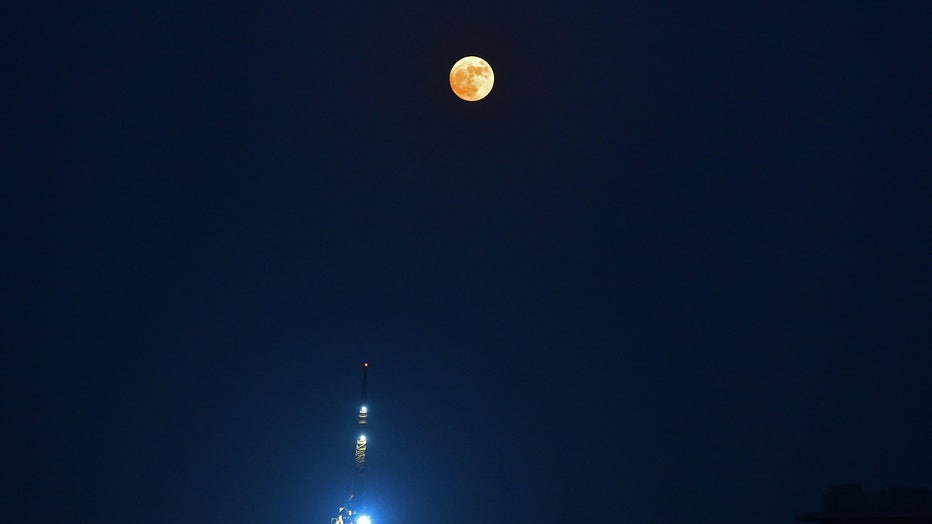
The Blue supermoon rises over the river Ganges, in Prayagraj on August 30, 2023. (Getty Images) . (Photo by SANJAY KANOJIA / AFP) (Photo by SANJAY KANOJIA/AFP via Getty Images)
According to FOX Weather, the moon will look its largest as it rises and sets on the horizon. This is what’s called a "moon illusion."
"It may be that when it is near the horizon there are objects, like trees and buildings, that it can be compared in size to, whereas in the middle of the sky there are no points of comparison, which makes it seem smaller," Sara Russell, a researcher with the Natural History Museum, said.
RELATED: India's lunar rover rolls onto the moon, days after spacecraft's historic touchdown
Take a look at the horizon just after twilight, FOX Weather recommends.
When is the next blue supermoon?
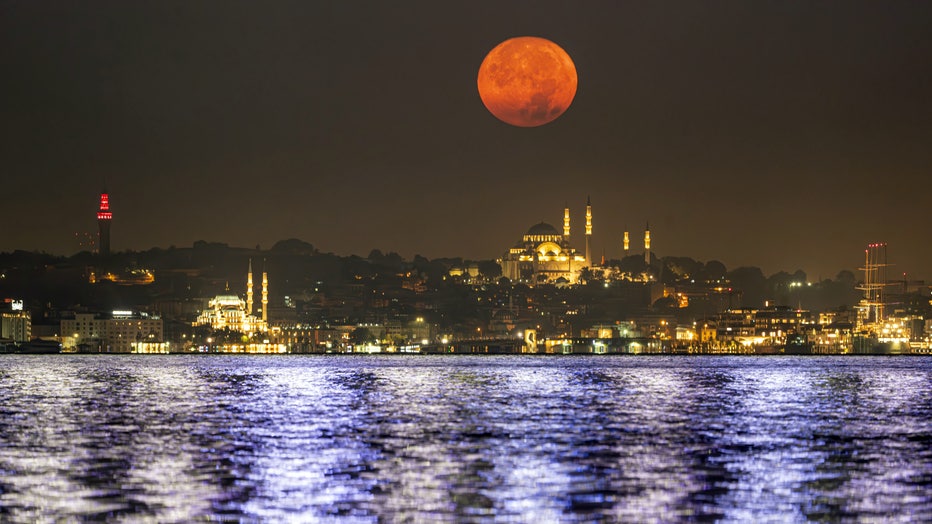
The 'Super Moon', in which the Moon is in the closest position to the Earth and is observed brighter and larger than normal, rises over Suleymaniye Mosque in Istanbul, Turkiye on August 30, 2023. (Photo by Salih Zeki Fazlioglu/Anadolu Agency via Gett
If you missed the month’s first spectacle, better catch this one. There won’t be another blue supermoon until 2037, according to Italian astronomer Gianluca Masi, founder of the Virtual Telescope Project.
Clouds spoiled Masi's attempt to livestream the supermoon rising earlier this month. He’s hoping for clearer skies this time so he can capture the blue supermoon shining above St. Peter’s Basilica at the Vatican.
Do you need binoculars to see the supermoon?
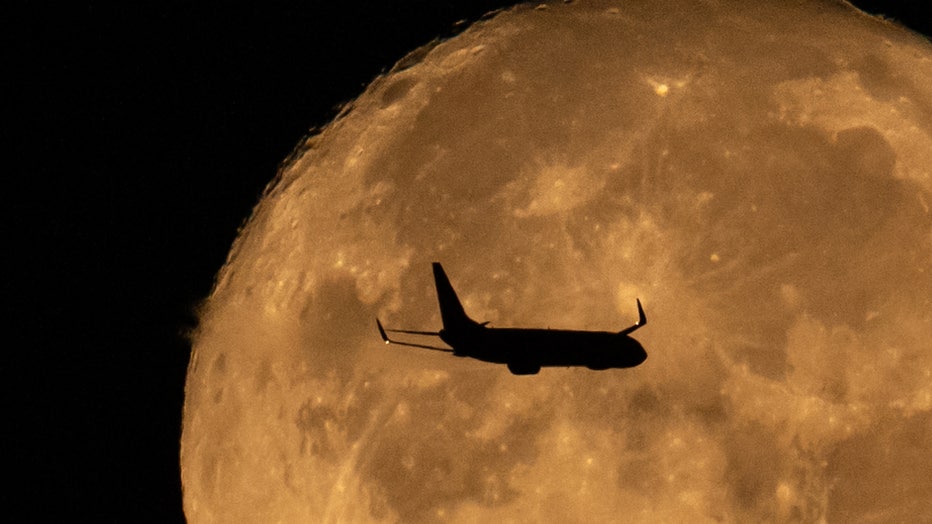
An airplane is seen as the Super Moon rises over Istanbul, Turkiye on August 30, 2023. (Photo by Cem Tekkesinoglu/Anadolu Agency via Getty Images)
Weather permitting, observers don’t need binoculars or telescopes — "just their own eyes." said Masi.
"I’m always excited to admire the beauty of the night sky," he said, especially when it features a blue supermoon.
How will the supermoon affect tides?
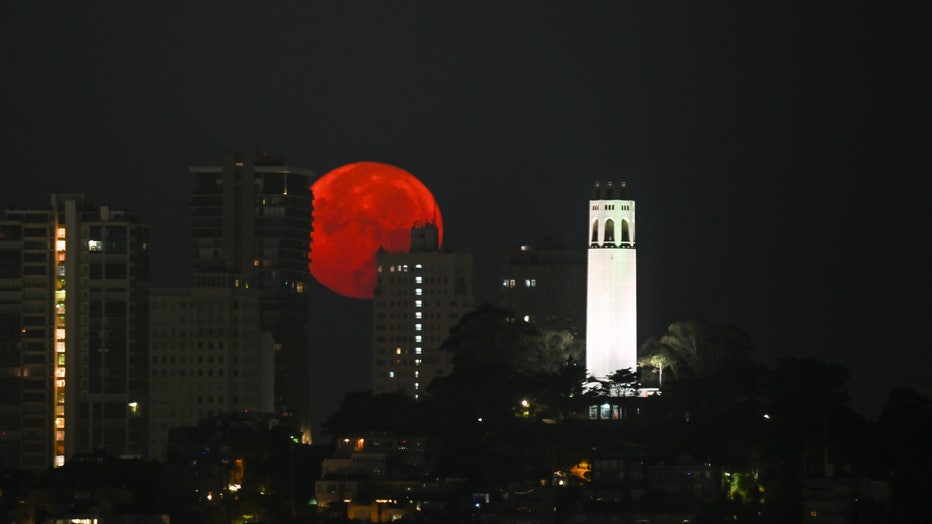
Moon sets behind Coit Tower in San Francisco, California, United States, the day before the super moon on August 30, 2023. (Photo by Tayfun Coskun/Anadolu Agency via Getty Images)
While a supermoon can make for a spectacular backdrop in photos of landmarks around the world, its intensified gravitational pull also makes tides higher.
It could raise tides above normal just as Hurricane Idalia lashes Florida’s west coast, exacerbating flooding from the storm.
"I would say the timing is pretty bad for this one," said Brian Haines, the meteorologist in charge at the National Weather Service office in Charleston, South Carolina.
It’s expected to make tidal flooding worse not only in Florida, but in states such as Georgia and South Carolina, where Haines’ office has been warning residents that parts of Charleston could be under water by Wednesday night.
When the moon is full, the sun and the moon are pulling in the same direction, which has the effect of increasing tides above normal ranges, said Kerry Emanuel, professor emeritus of atmospheric science at the Massachusetts Institute of Technology.
The moon's gravitational pulls are even stronger when it's closer to Earth, so the tides are even higher.
When is the next supermoon?
The first supermoon of 2023 was in July. The fourth and last of 2023 – after Wednesday’s supermoon – will be in September.
FOX Weather contributed to this report.

